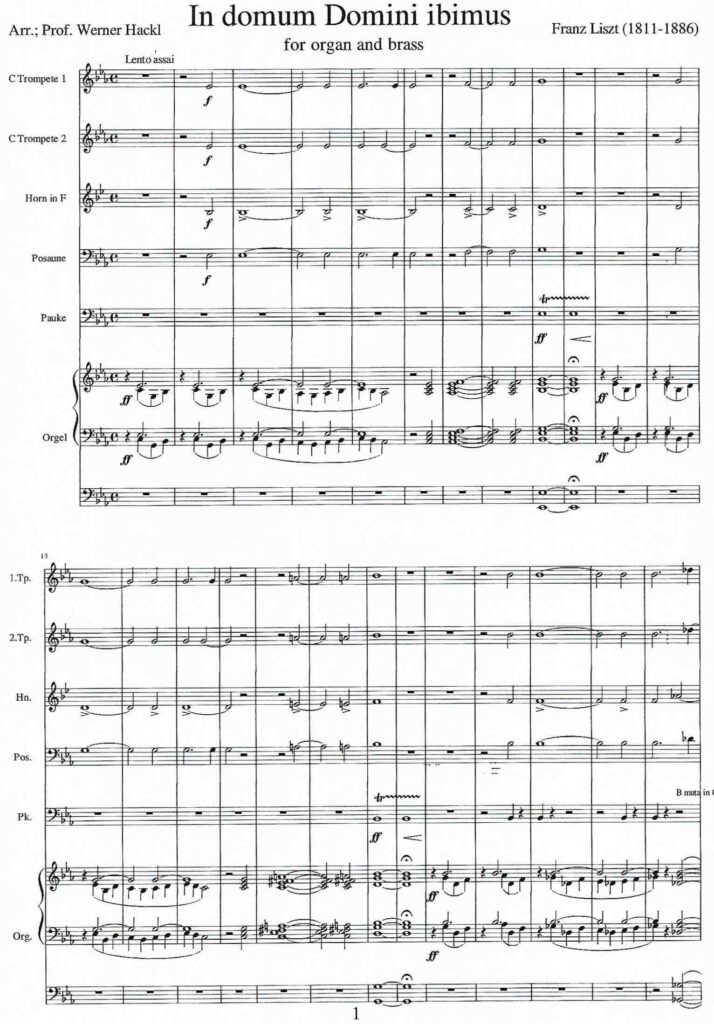Franz Liszt (1811-1886) „In domum Domini ibimus“ / ’We will go into the house of the Lord’

Ab 1861, Liszts 50. Geburtstag, widmete er sich verstärkt Kompositionen mit religiösen Themen und kirchenmusikalischen Werken. In Rom, wo er sich bis 1870 überwiegend aufhielt, führte er ein teils mondänes, teils mönchisches Leben und zog sich im Sommer 1863 in das Kloster Madonna del Rosario, wo ihn auch Papst Pius IX. besuchte. 1865 unterzog sich Liszt der Tonsur und erhielt die vier niederen Weihen. Als Kleriker trug er fortan den römischen Kragen und wurde als Abbé angesprochen.
Das vorliegende religiöse Werk der Romantik „In domum Domini ibimus“ – übersetzt „Wir werden in das Haus des Herrn gehen“ – stammt aus dem Psalm 121 der Bibel und ist im Original für Orgel, Chor, 2 Trompeten, 2 Posaunen und Pauken besetzt. Unter Hinweglassung des Chore ist das Werk eine dankbare Bereicherung für Blechbläser mit Orgel. Eine Mitteilung über dieses Stückes aus der allerletzten Zeit des Komponisten stammt von A. Göllerich1), der in seinem Buch „Franz Liszt“ es als Präludium für Orgel beigegeben hat.

From 1861, Liszt’s 50th birthday, he increasingly devoted himself to compositions with religious themes and church music. In Rome, where he mostly stayed until 1870, he led a part mundane, part monastic life and retired in the summer of 1863 to the monastery of Madonna del Rosario, where Pope Pius IX also visited him. In 1865 Liszt underwent tonsure and received the four minor orders. From then on, as a cleric, he wore the Roman collar and was addressed as an abbe.
The present religious work of the Romantic period “In domum Domini ibimus” – translated “We will go into the house of the Lord” – comes from Psalm 121 of the Bible and is originally scored for organ, choir, 2 trumpets, 2 trombones and timpani. With the omission of the choir, the work is a grateful enrichment for brass with organ. A communication about this piece from the very last days of the composer comes from A. Göllerich1), who included it as a prelude for organ in his book “Franz Liszt”.
1) Der aus Linz stammende Dirigent, Pianist und Musikschriftsteller August Göllerich (1859-1923) war Klavierschüler und Sekretär des Komponisten Franz Liszt. Bis zu dessen Tod 1886 war er Liszt freundschaftlich verbunden. The conductor, pianist and music writer August Göllerich (1859-1923) from Linz was a piano student and secretary to the composer Franz Liszt. He was on friendly terms with Liszt until his death in 1886
| sound sample / Tonbeispiel | score/parts PDF download: € 12,- | add to cart / in den Warenkorb |
